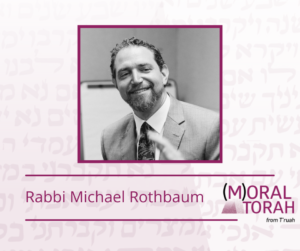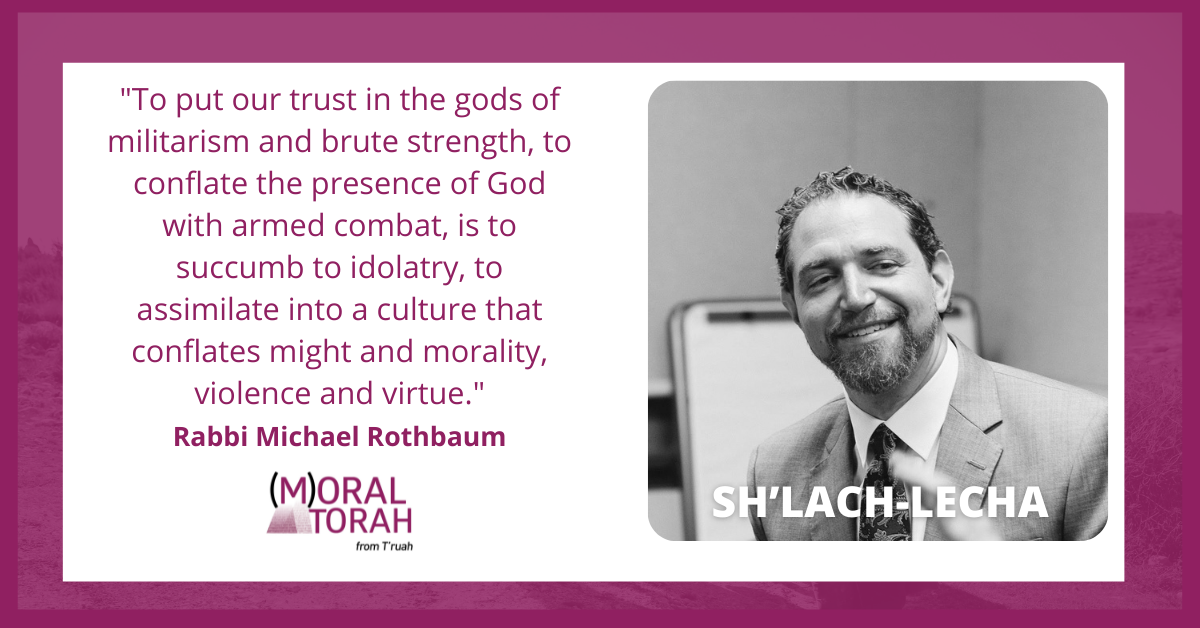A D’var Torah for Parshat Sh’lach-Lecha by Rabbi Mike Rothbaum
If you know the story of the scouts in Sh’lach-Lecha, you know it doesn’t end well. Twelve scouts are sent to investigate the land of Israel on God’s behalf. Two of the twelve, Joshua and Caleb, bring optimistic reports; with God’s help, they gush, we can overcome the obstacles before us and possess this bountiful land.
But it is the dire warnings of the other ten scouts that sway the Israelites. Predictions of doom leave them panicked and afraid. The Israelites turn on Moses and Aaron. Chaos reigns. God, exasperated by the stiff-necked people, decrees that they will all die in the wilderness, except for Joshua and Caleb.
For years, I’ve taught this text as a cautionary tale for those doing community or congregational organizing. The challenges before anyone doing organizing work can seem insurmountable. A centuries-old racial caste system; a growing chasm between rich and poor; the looming climate crisis; relentless assaults on the full personhood of women and queer people: Each can seem impossibly daunting. Jews inspired to pursue justice in such a world can fall prey to the fatalism of the ten scouts, convinced that change is impossible.
Sign up to receive (M)oral Torah in your inbox each week.
Our role models as organizers and advocates, instead, are Joshua and Caleb. Like that famous poster of Rosie the Riveter, we roll up our sleeves and call out to each other, “We can do it!”
But, in quieter moments, we remember the it that Rosie was rallying us to do was win a war. Given the bloodshed of the past month, it occurred to me that, as much as I love Joshua and Caleb as models for community organizing, they weren’t pursuing fairer working conditions, higher wages, universal healthcare, or women’s autonomy. Their efforts to rally the troops were not metaphorical — and neither, for that matter, were the troops. The war was not a war on poverty, inequality, or transphobia. It was war on seven nations Joshua and Caleb were marshaling the Israelites to attack, subdue, and obliterate.
This is the call that motivates some Jews today. Centuries of brutalization, landlessness, and persecution have inspired many of us to identify with the bloodiest narratives in our texts and our history. Certainly, this is most evident in Israel. The Maccabees, long ago written out of biblical history by our rabbis, have been given new life as proto-Zionist heroes. Numerous Israeli military campaigns have been given biblical names, with Palestinians seemingly standing in for Israel’s biblical enemies. For example, the 2012 incursion into Gaza, known in the English-language media as “Operation Pillar of Defense,” in Hebrew was Amud Anan — “Pillar of Cloud,” a reference to nothing less than the manifestation of God that led the Israelites through the desert toward Eretz Yisrael. This spills over into American Judaism as well, perhaps most noteworthy in the fascination with — even fetishization of — the Israeli Defense Force.
Reversing the prophet Zechariah’s directive (4:6), those who hold this perspective seek security not by God’s spirit, but by might and power; by muscle, steel, and ammunition.
Given this development, it’s important to remember that Jewish thought evolved to prohibit the killing of the nations the scouts were sent out to reconnoiter. Maimonides tells us that those nations have all mixed together, so obliterating them is impossible (Mishneh Torah, Laws of Prohibited Marriage 12:25) — and, in any event, “the memory of those peoples” has already been obliterated (Mishneh Torah, Laws of Kings and Their Wars 5:4).
Moreover, for progressive Jews who reject this militaristic literalism, it’s essential that we remind ourselves how powerful and ancient the Jewish metaphorical imagination is. In the most famous example, the Torah’s edict to punish criminal offenders, “eye for eye, tooth for tooth,” is read by our rabbis to instead mean punishments should be appropriate to crimes, regardless of the station or status of the offender (Bava Kamma 83b-84a). A text purportedly instructing us to answer violence with violence is reimagined and repurposed, teaching us instead to treat all members of our society as equal before the law.
Find more commentaries on Parshat Sh’lach-Lecha.
It’s that Jewish imagination and that Jewish creativity — that Jewish boldness — that this hour demands. To put our trust in the gods of militarism and brute strength, to conflate the presence of God with armed combat, is to succumb to idolatry, to assimilate into a culture that conflates might and morality, violence and virtue. Yes, there are violent men and violent moments in our sacred Jewish texts; we’d be foolish to pretend otherwise. But the meaning we make from those texts is up to us, as inheritors of the rabbinic tradition of recreation and rebirth.
 That tradition demands that we keep the search going for a land of bounty, a land of blessing enough for all of God’s creation.
That tradition demands that we keep the search going for a land of bounty, a land of blessing enough for all of God’s creation.
And so, we ask ourselves: What is the land we are scouting? What are the blessings we seek there? Will we be brave enough to insist that all humanity is entitled to those blessings? And will we inspire each other to continue the search, even when it seems impossible, all of us bold enough to insist that it is no dream?
Rabbi Michael Rothbaum is spiritual leader of Congregation Beth Elohim in Acton, Mass. He serves on the advisory boards of the Jewish Alliance of Law and Social Action (JALSA) and the New England Jewish Labor Committee, and is a member of the T’ruah Boston cluster. He lives in Acton with his husband, Yiddish singer Anthony Russell.

